General
Makerere honours late Dr. Joshua Baitwa Mugyenyi
Published
13 years agoon
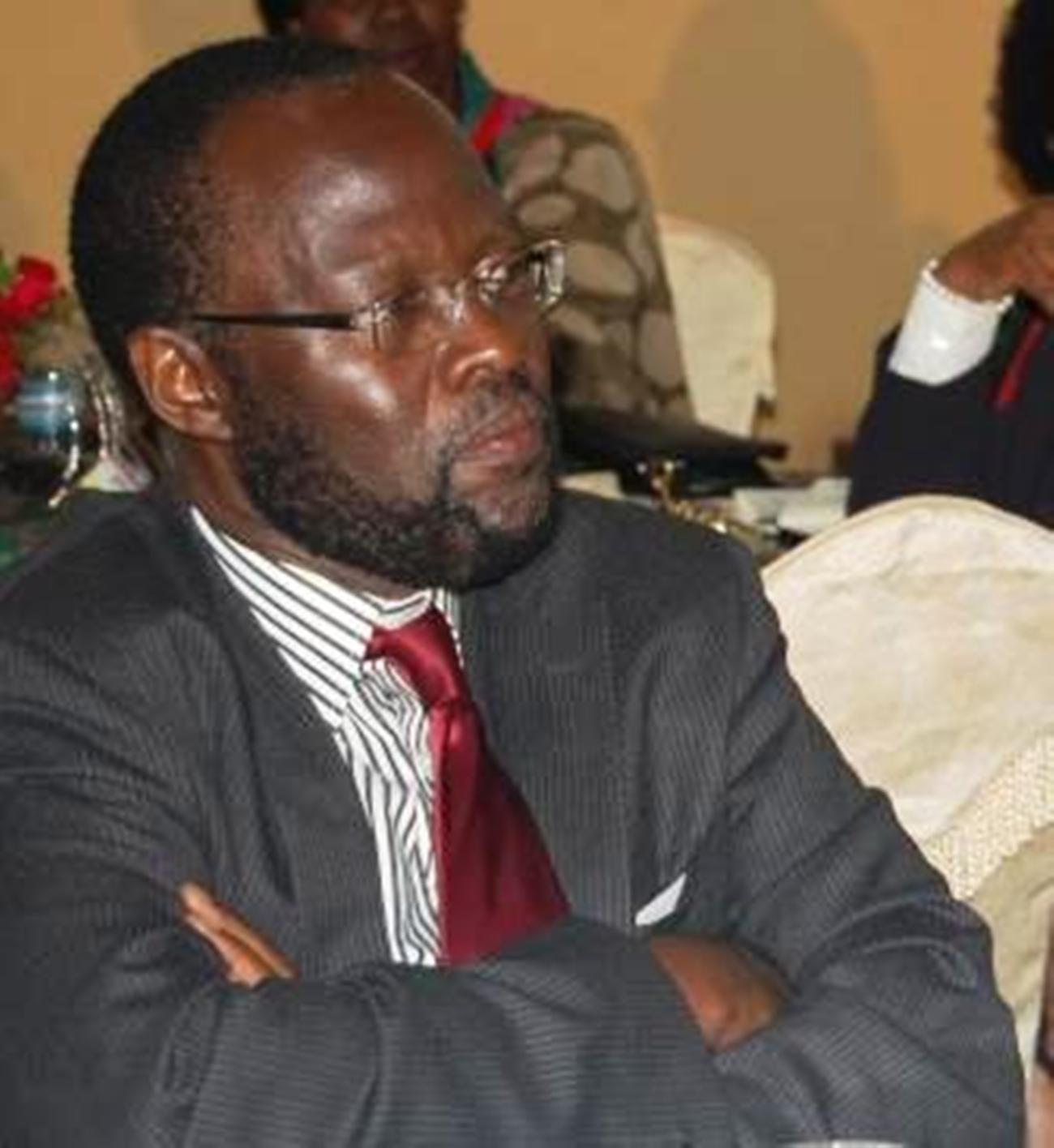
It was befitting to dedicate the fourth lecture in the Makerere Africa Lecture Series to celebrating the life of Dr. Joshua Baitwa Mugyenyi, a brilliant student, distinguished alumnus, member of faculty and who while still a student at Makerere in 1970, was a part of the group that conceived the idea of having the Africa Lecture Series at the campus.
The fourth lecture in the Makerere Africa Lecture Series, was held on 15th March 2012 marking exactly ten years since Joshua passed on. The lecture focused on paying tribute to the strong values that the late Joshua Baitwa Mugyenyi stood for. This witnessed the launch of the Dr. Joshua B. Mugyenyi Social Transformation Foundation and the promotion of the Makerere University Female Scholarship Foundation.
Professor Peter Anyang’ Nyong’o, the Minister of Medical Services in the Republic of Kenya and also former Guild President of the Makerere University, gave the key note address.
“Let the spear of intellectual clarity burn wherever he is resting; let this foundation established in his memory spearhead excellence among students who will benefit from it; let the African people be liberated from political oppression and economic exploitation through the energies of the people as Joshua Baitwa Mugyenyi would have wanted it,” he said in his speech.
Born on 27th May 1947 in Kajara County in Ankole Kingdom, Dr. Joshua Baitwa Mugyenyi died on 15th March 2002, but his legacy is still lives on in the lives of individuals he worked with, associated with as well as those he mentored.
The Acting Vice Chancellor of Makerere University, Professor Venansius Baryamureeba welcomed the Guest of Honour, Rt. Hon. Professor Apolo R. Nsibambi, a distinguished alumnus, and Former Chancellor of Makerere University to the public lecture and thanked him for graciously accepting to launch the Dr. Joshua Baitwa Mugyenyi Social Transformation Foundation.
Professor Baryamureeba informed the congregation that Makerere University together with the family and friends, do remember Dr. Joshua Baitwa Mugyenyi as a selfless individual, who gave his best at all times. “We chose this day, 15th March 2012 to remember a brilliant student, distinguished alumnus, former member of faculty and to commemorate a lifetime of achievements of a man who was brutally frank, stood for only the truth, and who fought for the rights of others even at the expense of risking his own life,” remarked Professor Venansius Baryamureeba.
“On this 15th day of March 2012, we join the nation in celebrating the life of an ever optimistic and passionate leader-transformer and eloquent discussant of the socio-economic transformation of Uganda and Africa,” he added.
Joshua Baitwa Mugyenyi joined Makerere University in June 1968 and graduated in 1971 with a Bachelor of Arts in Political Science and Public Administration. While at Makerere, Joshua Baitwa Mugyenyi excelled in academics, he served as Vice President of the Students’ Guild who actively participated in fighting against all forms of injustices and threats to students’ welfare.
Through his teaching career, Josh, as he was fondly known, passionately shared his knowledge at the national and international levels. He was a Senior Lecturer at his alma mater, Makerere, in addition to teaching in other universities in Swaziland and Canada. Mugyenyi co-authored a number of books and published several peer reviewed papers in prominent journals. At the time of his death on 15th March 2002, he was a proactive member of the Makerere University Council-the top policy making organ and Chairperson of the Convocation. He mentored many and significantly contributed to the university motto: We Build for the Future.
In honour of the late Joshua Baitwa Mugyenyi, the Ag. Vice Chancellor of Makerere University, Professor Venansius Baryamureeba welcomed an exceptionally accomplished alumnus and former Guild President, and now Minister of Medical services in the Republic of Kenya, Professor Peter Anyang’ Nyong’o to deliver a public lecture on “Social Transformation in Contemporary Africa: Reminiscences of Dr. Joshua B. Mugyenyi.”
As a token of appreciation and friendship, both families exchanged gifts. On unwrapping the gifts, they were pleasantly surprised to find that it was the same photo taken when they were members of the Guild in 1970. Prof. Anyang’ Nyong’o described it as a “divine intervention” amidst laughter.
Professor Baryamureeba informed the congregation that while students at Makerere, the trio-Joshua Baitwa Mugyenyi, Peter Anyang’ Nyong’o and Daudi Taliwaku conceived the idea of the Africa Lecture series.
“As the only surviving member of the Students’ Guild Executive 1969/70 trio that conceived the Africa Lecture Series, there is no greater way to celebrate the memory of our dearly departed Alumni, the late Dr. Joshua B. Mugyenyi and the late Ambassador Daudi Taliwaku than to have one of the original three present at this lecture. We are extremely grateful to you Hon. Prof. Peter Anyang’ Nyong’o for taking time off your demanding constituency and ministerial work to be with us today for yet another Public Lecture,” remarked the overjoyed Vice Chancellor.
Hon. Professor Peter Anyang’ Nyong’o moved to the podium, but there was a sudden moment of silence, a reflection of a person re-calling a past history, and an audience ready to listen to an oratory of a man who had touched people from all walks of life.
With nostalgia, Professor Peter Anyang’ Nyong’o delivered a moving public lecture on Dr. Joshua Baitwa Mugyenyi whom he met in 1968 at Makerere University, but remained very close until when death robbed him 10 years ago.
“Joshua was a brave and courageous individual who used the mighty power of the pen and the written word to fights all forms of social injustices at Makerere, in Uganda and beyond. The fearless Joshua also risked his life to engage President Apolo Milton Obote on policies that he felt were undermining democracy,” stressed Professor Anyang’ Nyong’o during the public lecture.
One Sunday in January 1971, Peter Anyang’ Nyong’o and Joshua woke up at Makerere only to observe that Radio Uganda was playing martial music all day, Uganda Television was showing cartoons all day and by the end of the day a rough voice came on both radio and television to say that the government of Apolo Milton Obote was no more: “It is now a military government,” announced Smart Gwedeko, a mere warrant officer.
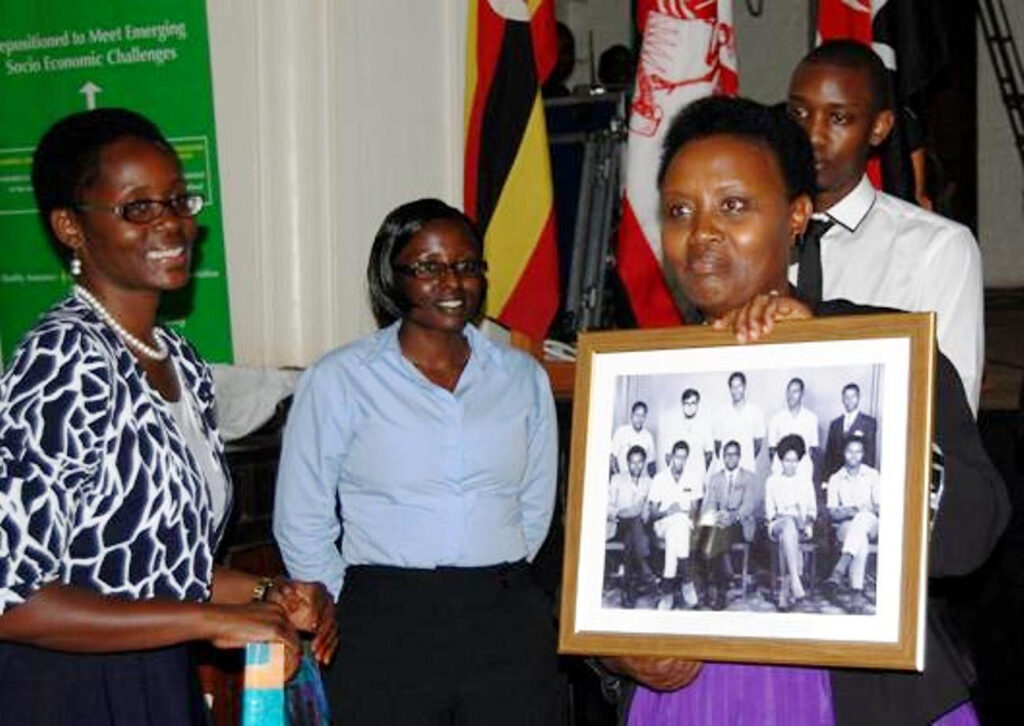
Prof. Peter Anyang’ Nyong’o said Joshua Baitwa Mugyenyi never gave up his disgust with the military regime. Although Joshua stayed at Makerere for some time as a tutorial fellow in the Department of Political science, continued as a Lecturer at the Institute of Public Administration, did his post graduate work in Manchester, came back as Senior Lecturer; his spirit was always urging him to do something about this military menace in Uganda. At the beginning of the eighties, after the debacle of the general elections of 1980, Joshua became a founder member of the Uganda Patriotic Movement (UPM) which eventually metamorphosed into the National Resistance Movement.
Professor Anyang’ Nyong’o informed the friends of Joshua gathered in the Main Hall that he had told the stories to describe the world Joshua lived in and the world he sought to change. “I have told these stories not to re-count the personal relations and experiences, but to shade light on the African world Joshua lived in and tried to change for the better; to get some insight into issues related to social transformation in contemporary Africa,” he stressed.
Joshua took theory to point of practice, and was always ready to engage in auto-criticism. “I remember in 1996, Joshua was very determined that the NRM should have a political transition in which the leaders of the NRM revolution would democratically pass the torch to a new generation so as to avoid tendencies towards authoritarianism,” Professor Anyang’ Nyong’o added.
Professor Anyang’ Nyong’o also observed that the challenges to democratic governance and social transformation in Africa remain pertinent today as they were then. But they cannot be known or practised without such piercing analyses and scholarship as was the case with Joshua. And scholarship, within and outside academic institutions, is always a social engagement. It is not confined to those of us who have degrees, it is the enterprise of those ready to think, write and speak on social issues without the cloud of dogma, bias and various forms of chauvisim.
Paying tribute to Joshua, Dr. Ezra Suruma, Senior Presidential Advisor on Finance and Economic Planning, said Joshua’s number one quality was courage. Dr Suruma was optimistic that if in every generation, we have one man or woman of Joshua’s intellect and courage, Uganda’s freedom would be fundamentally advanced. “As we remember Joshua, let us pray that God will raise men and women of his quantum of intellect and courage,” remarked Dr. Suruma who met Joshua in September 1979 at Makerere University and who together with Joshua agreed to form the Uganda National Movement (UNM). According to Dr. Suruma, Joshua’s life, his works and his example can be summarised as: “I will declare the truth. And I will fight for what is right, even though it is dangerous. And if die, I die.”
Mr. Fred Guweddeko, a researcher, at Makerere Institute of Social Research, informed the audience that Dr. Joshua Baitwa Mugyenyi had a dream to become the Vice Chancellor of Makerere University. Mr. Fred Guweddeko together with Dr. Joshua Baitwa Mugyenyi embarked on gathering data aimed at instituting reforms at Makerere when latter become the Vice Chancellor after Professor P.M.J. Ssebuwufu’s reign. Mr. Guweddeko said this is a dream he never lived to see.
Professor Mahmood Mamdani, a renowned scholar and Director of the Makerere Institute of Social Research (MISR), said the best of all independence is the independence of thought. He advocated for the need to turn Makerere into a research led university, and a purely public university not to benefit only the state, but society at large.
Dr. Joshua Baitwa Mugyenyi worked at the Bank of Uganda for 14 years. The Deputy Governor, Bank of Uganda, Dr. Louis Kasekende said many members of staff at the Bank of Uganda remember him for his open management style.
He initiated reforms aimed at improving the welfare of workers and respected all people regardless of their rank. “It was during his tenure that the Bank of Uganda launched the pension scheme. He revamped the training scheme, improved the appraisal system and initiated the House Advance and Building Loan scheme,” he said. “We in the Bank of Uganda feel proud to be associated with this noble cause of spearheading social transformation.”
Mrs. Mary Mugyenyi, the widow, thanked all the people who had filled the Main Hall to capacity for honouring their invitation. In a special way, she thanked the Makerere University Gender Mainstreaming Directorate, the Bank of Uganda and their consultant, Mr. George Piwang-Jalobo for the tremendous support towards the success of the public lecture and launch.On behalf of her siblings, one of the daughters of the late Joshua said that their father loved nature, loved children and he always brought joy, values that they will seek to emulate. “We shall be exemplary. We shall love each other. We shall always remember what our father stood for,” she said.
She said her husband was a family man, dedicated father and a person who encouraged free thinking in the family. She said that her husband encouraged and supported her to pursue her career and political aspirations.
“Today, 15th March 2012, marks the celebration of the past and also the launch of the future of Joshua immortalised through the- Dr. Joshua B. Mugyenyi Social Transformation Foundation. The best way to celebrate his life was to focus on his passion for education and knowledge. This Foundation will focus on the bright, but disadvantaged youth to access education,” she said.”The Makerere University Female Scholarship Foundation, which supports girls from disadvantaged socio-economic background, will be the first beneficiary of the Grant from the Dr. Joshua Baitwa Mugyenyi Foundation.”
Mrs. Mugyenyi added that the foundation will also support research and increase funding for the treatment of cancer and other non-communicable diseases.
Launching the Foundation, the Guest of Honour, Professor Apolo R. Nsibambi, former Prime Minister of the Republic of Uganda said: “I am honoured to launch the Dr. Joshua Baitwa Mugyeni Social Transformation Foundation to keep the memory of my student, colleague and friend alive. I pray that the Foundation will be blessed and prosper to advance the ideals, values and convictions for which Dr. Joshua Baitwa Mugyenyi lived and worked.”
Professor Apolo Nsibambi contributed Shs1 million towards the Dr. Joshua Baitwa Mugyenyi Social Transformation Foundation.
The Chancellor of Makerere University, Professor George Mondo Kagonyera, and also a very close friend of the Mugyenyi family thanked Mrs. Mary Mugyenyi for looking after the children and continuing to advance the principles that her husband, the late Dr. Joshua Baitwa Mugyenyi held dearly.
Written by: Ritah Namisango, Public Relations Office
You may like
-
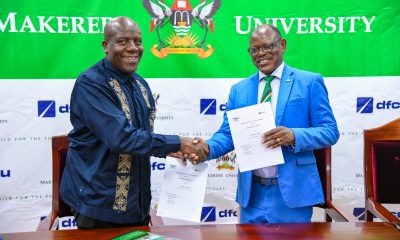

Press Release: Mak & DFCU Partner to Enhance Higher Education, Research & Student Support
-
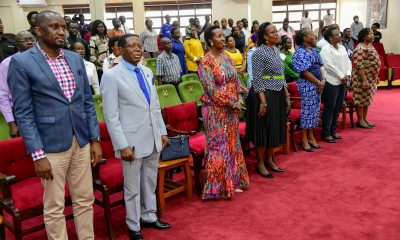

Leadership must be anchored in integrity-Mrs Kagina
-
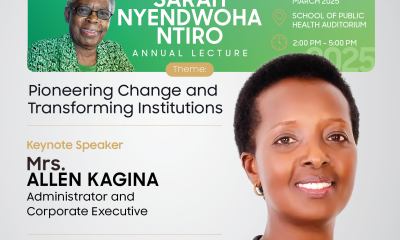

Announcing the 3rd Sarah Ntiro Memorial Lecture with Allen Kagina as the 2025 Distinguished Speaker
-
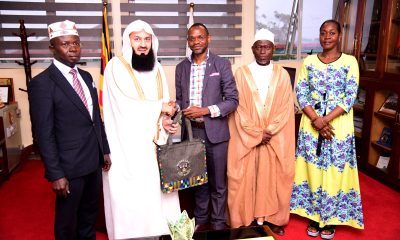

Mufti Menk urges youth on productivity, social media usage & entrepreneurship
-
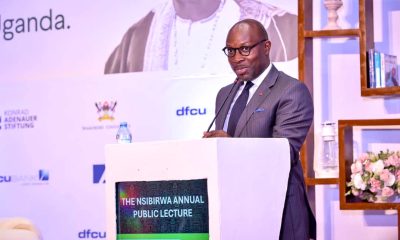

The Second Martin Luther Nsibirwa Annual Public Lecture
-
![[L -R] Ms. Amy Petersen - Education and Cultural Affairs Officer, U.S. Embassy Kampala; Dr. Ronald Bisaso - Deputy Principal CEES; Mr. Yusuf Kiranda - University Secretary; Prof. Barnabas Nawangwe -Vice Chancellor; H.E William W. Popp - US Ambassador to Uganda; Prof. Anthony Mugagga Muwagga, Principal CEES and Ms. Ellen B. Masi - Public Affairs Officer, U.S. Embassy Kampala at the Yusuf Lule Auditorium before the lecture on 7th November 2023.](https://news.mak.ac.ug/wp-content/uploads/2023/11/4th-Annual-Senteza-Kajubi-Lecture-7thNov2023-400x240.jpg)
![[L -R] Ms. Amy Petersen - Education and Cultural Affairs Officer, U.S. Embassy Kampala; Dr. Ronald Bisaso - Deputy Principal CEES; Mr. Yusuf Kiranda - University Secretary; Prof. Barnabas Nawangwe -Vice Chancellor; H.E William W. Popp - US Ambassador to Uganda; Prof. Anthony Mugagga Muwagga, Principal CEES and Ms. Ellen B. Masi - Public Affairs Officer, U.S. Embassy Kampala at the Yusuf Lule Auditorium before the lecture on 7th November 2023.](https://news.mak.ac.ug/wp-content/uploads/2023/11/4th-Annual-Senteza-Kajubi-Lecture-7thNov2023-80x80.jpg)
Prof. Senteza Kajubi eulogized for enormous contribution towards the education sector
General
Simplicity, Service & Scholarship: Hallmarks of Professor Livingstone Luboobi’s Legacy
Published
10 hours agoon
July 18, 2025By
Eve Nakyanzi
On Wednesday 16th July 2025, Makerere University lost one of its most cherished sons, Professor Livingstone Sserwadda Luboobi. Described as a mathematician, academic leader, and humble servant, Professor Luboobi devoted more than five decades to the university, rising through the ranks to become Vice Chancellor, and leaving a legacy defined by simplicity, service, and scholarship.
Born to Lameka Serwadda and Sanyu Serwadda on 25th December 1944 in Mitondo, Kalisizo, Kyotera District, Professor Luboobi’s academic career begun as a third-year student at Makerere and continued with unwavering loyalty until his passing. His life’s work reflected not only a commitment to mathematics but also nurturing generations of scholars and leaders across Uganda and beyond.
A funeral service was held in his honour at St. Francis Chapel, Makerere University on 18th July 2025. It was a moment of solemn remembrance and heartfelt tribute. Rev. Canon Dr. John Senyonyi delivered the sermon titled “Only God Knows,” reminding mourners of the mystery and grace of life’s journey. Rev. Canon Geoffrey Byarugaba represented the Kampala Diocese at the service, while former St. Francis Chaplain, Rev. Dr. Canon Johnson Ebong thanked Professor Luboobi for spearheading the Chapel’s expansion. Friends, colleagues, and family members filled the chapel, joined in mourning but also in gratitude for a life that had deeply touched theirs.

Mrs. Lorna Magara, Chairperson of the University Council, spoke movingly about Professor Luboobi’s faithfulness, likening his life to the biblical call in Mark 10:43, “Whoever wants to become great among you must be your servant.”
In his condolence message, the Vice Chancellor, Professor Barnabas Nawangwe, hailed Professor Luboobi as a visionary leader whose legacy is deeply woven into Makerere’s identity as a research-led institution. He credited Professor Luboobi with laying the groundwork for a culture of inquiry—championing graduate programmes, encouraging doctoral training, and fostering international collaborations that strengthened the university’s research profile. “He believed in building systems, not just structures,” noting that many of Makerere’s current research policies stem from his leadership. Even in retirement, Professor Luboobi remained a source of wisdom and guidance, quietly shaping the future of the university he so deeply loved.
Speaker after speaker painted a portrait of a man who led not by pomp, but by quiet strength and deep conviction. The Principal, Professor Winston Tumps Ireeta, speaking on behalf of the College of Natural Sciences (CoNAS), described Professor Luboobi as a foundational figure whose influence is deeply etched in the structures and spirit of the college. He spoke with emotion about Luboobi’s unwavering commitment to academic integrity and his belief in the power of mentorship.

“He was not just a mathematician,” Professor Ireeta said, “he was a visionary who understood the soul of the university. Even in retirement, he remained an advisor, a guide, and a quiet force of wisdom.” He concluded by saying that the college would continue to draw from his example as it navigates the future of science and innovation in Uganda.
Professor Luboobi’s illustrious career at Makerere University included serving as Head, Department of Mathematics from 1990 to 1991. The current Head of Department, Dr. Ismail Mirumbe remembered him as a pillar in the teaching and development of mathematics in Uganda
Professor John Mango, who served as Head, Department of Mathematics during Professor Luboobi’s term as Vice Chancellor from 2004 to 2009 described him as a towering figure of integrity and principle, someone who not only upheld the highest standards of academic conduct but insisted that others around him do the same. “He was a pillar in the department,” Prof. Mango remarked, “and his moral compass was unwavering.”

He recalled instances where Professor Luboobi made firm decisions, including terminating contracts when integrity was compromised, setting a tone that shaped the department’s reputation for honesty and excellence. Even as Vice Chancellor, he remained deeply involved in the department’s affairs, teaching, supervising students, all the while handling top administrative duties punctually. Prof. Mango spoke with great admiration of a man who led by example, mentored many, and whose contributions to mathematics education, research, and policy-making continue to shape the future of the discipline in Uganda and beyond.
According to an article from 1990 written by Dr. Vincent Ssembatya and Andrew Vince at the University of Florida, the Uganda Mathematical Society (UMS), which was formally established on 25th November, 1972 has since inception enjoyed major support from Makerere University and Kyambogo University in terms of infrastructure and leadership. Professor Paul Mugambi, who was also present at Professor Luboobi’s funeral service was elected first president of the UMS. Dr. Saul Nsubuga from the Department of Mathematics represented UMS at the service, honouring Professor Luboobi’s pioneering role in the discipline.
The service also featured tributes from close friends and family. Loved ones shared stories of a man who remained grounded no matter how high he rose, a man who valued relationships and walked closely with his faith. His children and grandchildren remembered him as a father who was ever-present, a listener, and a source of steady guidance.

Professor Daniel Kibuule, son of the late Professor Luboobi and Dean, Faculty of Health Sciences at Busitema University, delivered a deeply personal tribute that painted a full portrait of his father’s life, values, and final days. He expressed gratitude to the University leadership, family, friends, and medical professionals who stood with them during a challenging period. He particularly thanked his siblings, Dr. David Kimera and Dr. Irene Nakiyimba for their unwavering role in caring for Professor Luboobi through illness.
He spoke of a man who, despite great academic accolades, remained deeply humble and committed to discipline, simplicity, and faith. From instilling punctuality and responsibility to ensuring his children charted their own paths, none bearing his surname “Luboobi”, Prof. Luboobi was intentional in every lesson he passed on. Kibuule recalled his father’s insistence on being at home even in his final moments, his strong connection to Christ, and his quiet strength despite his failing health.
Former students and mentees echoed the same sentiments, of a teacher who was generous with his time and invested deeply in others’ growth. The community that gathered was not only there to grieve but to celebrate the quiet legacy of a man whose example continues to live on.
Among the mourners were public figures and leaders, including Hon. Abed Bwanika, Member of Parliament for Kimanya-Kabonera, Hon. Nyombi Thembo, the Executive Director Uganda Communications Commission, and Hon. Dr. Ham-Mukasa Mulira, former Minister of ICT, among others.
In his passing, Makerere University has lost a pillar, but his life reminds us that greatness lies in consistency, in humility, and in service to others. Professor Luboobi’s memory will continue to live on in the minds he shaped, the systems he built, and the values he embodied. He ran his race with grace.
The Writer is a Volunteer in the Public Relations Office, Makerere University
Please click the embedded video below to view the service livestream
General
Public University Legal and Accounting Officers Trained on Governance and Compliance
Published
2 days agoon
July 17, 2025By
Eve Nakyanzi
Legal and accounting officers from public universities across Uganda have convened, for a high-level training workshop organized by Makerere University. The three-day training, taking place from July 16th to 18th, 2025, is aimed at strengthening legal frameworks, improving institutional governance, and ensuring compliance with public finance and procurement laws within higher education institutions.
Ms. Lorna Magara, Chairperson of the Makerere University Council and Guest of Honour at the opening session, commended the initiative as timely and necessary. She addressed the growing backlog of court cases affecting Makerere and other public universities and outlined measures already taken to mitigate legal risks. These include the establishment of a Legal Rules and Privileges Committee and the Directorate of Legal Affairs, part of a broader strategy to improve legal compliance and foster good governance.
Representing the Vice Chancellor, Prof. Winston Tumps – Ag. Deputy Vice Chancellor (Finance and Administration), described the training as both strategic and practical. “It is imperative that we learn from each other, especially in how we handle employee litigation and institutional legal risks,” he remarked. He added that the program is designed to promote experience-sharing across universities and enhance collective institutional growth.

In his address, Mr. Yusuf Kiranda, University Secretary at Makerere University, emphasized the urgent need for robust legal oversight and more effective case management mechanisms within public universities.
The training featured a keynote address by the Attorney General of Uganda, Hon. Kiryowa Kiwanuka, who provided critical insights into legal expectations for public institutions. He warned that failure to heed legal advice could result in personal liability for accounting officers, citing a precedent involving the Uganda Cancer Institute. “Universities must consult the Attorney General’s chambers before entering into major contractual obligations,” he advised, urging legal officers to document decisions meticulously as proper record-keeping forms the first line of defense in legal disputes.

Hon. Kiwanuka further discussed the government’s ongoing efforts to recentralize legal services to ensure alignment with the Attorney General’s office. He cautioned in-house counsel against becoming overly entangled in decision-making processes, stressing the need for objectivity. Other key issues he addressed included contract approvals, misuse of Memoranda of Understanding (MoUs), and lapses in procurement processes, particularly at the close of financial years.
Participants also benefited from insights by Hon. Justice Musa Ssekaana of the Court of Appeal, who offered an in-depth analysis of judicial review and its significance in promoting lawful, transparent university governance. He called on university legal officers to act with clarity, timeliness, and accountability.
Lady Justice Joyce Kavuma, Judge of the High Court, delivered a comprehensive presentation on dispute and claim management involving public universities. She addressed emerging trends in civil litigation, emphasizing the importance of due process, transparency, and clear communication in resolving employment, student, and contractual disputes. Drawing on real case examples, she urged institutions to strengthen internal systems, embrace participatory governance, and adopt regional best practices to minimize litigation and protect institutional reputation.

The training reflects a shared commitment among public universities to build a more accountable, legally sound, and strategically aligned higher education system in Uganda. Through peer learning and collaboration, participating institutions aim to reduce litigation, enhance institutional autonomy, and uphold the rule of law.
Participating universities include Makerere University, Kyambogo University, Mbarara University of Science and Technology, Busitema University, Mountains of the Moon University, and Lira University.
The training concludes on July 18th 2025, with sessions focusing on employment dispute management in public universities and the implications of recent PPDA Appeals Tribunal decisions on procurement and disposal practices within public entities.
General
Celebrating the Life of Prof. Livingstone Sserwadda Luboobi
Published
2 days agoon
July 17, 2025By
Mak Editor
A Visionary Leader, Seasoned Mathematician, & Humble Academician
It is with profound love and respect that we celebrate the life of Prof. Livingstone Sserwadda Luboobi, a distinguished scholar, transformative leader, and beloved Vice Chancellor Emeritus of Makerere University. His legacy is woven in the fabric of African higher education, marked by intellectual brilliance, unwavering commitment to academic excellence, and a life of selfless service.
A Life of Purpose and Vision
Prof. Luboobi was more than a mathematician. He was a visionary, whose work transcended equations and research papers. Serving as Vice Chancellor from 2004 to 2009, he led Makerere University through a critical period of growth and transformation. Under his guidance, the university expanded its reach, strengthened its academic rigor, and embraced innovation and reform. His calm demeanour and principled decision-making earned the admiration of students, faculty, and peers alike.
Prof. Luboobi was deeply committed to nurturing talent and fostering intellectual curiosity, leaving an indelible mark on the institution’s culture and future direction.
Beyond Uganda, Prof. Luboobi’s influence resonated across the global academic community. He was a passionate advocate for the transformative power of science and education, often speaking at international forums and collaborating on research that bridged continents and disciplines. His work helped elevate the profile of African scholarship on the world stage.
His legacy endures not only in the impressive body of work he left behind but also in the countless lives he touched – students, educators, and leaders who continue to draw inspiration from him.
Academic and Leadership Journey at Makerere University
An illustrious alumnus of Makerere University, Prof. Luboobi graduated with First Class Honours in Mathematics, laying the foundation for an extraordinary academic journey. He pursued further studies at the University of Toronto (MSc in Operations Research, 1971-72) and the University of Adelaide (PhD in Biomathematics, 1978–80). His scholarly journey spanned prestigious institutions worldwide, including UCLA, the University of Bergen, and the University of Dar es Salaam, establishing him as a scholar of global repute and a proud ambassador of African intellectualism.
Prof. Luboobi’s service to Makerere begun in 1970 as a Special Assistant-remarkably, while still an undergraduate, rising through the ranks to full Professor in 1997. He served as Head of Department, Dean of the Faculty of Science (1994–2001), and later became the university’s first elected Vice Chancellor. His tenure brought new energy to institutional leadership, characterized by transparency, inclusivity, strategic direction and accountability.
Strategic Reforms and Institutional Impact
A true architect of transformation, Prof. Luboobi chaired the development of Makerere’s first locally-conceived Strategic Plan (1990–91). He was instrumental in securing a UGX30 billion grant from NORAD in 1999, which revitalized key academic areas such as computing, gender studies, and food science. He co-founded the Makerere University Private Sector Forum, bridging the gap between academia and industry, and strengthening alumni engagement and resource mobilization.
Pioneering Biomathematics and Mentorship
As one of Africa’s pioneering biomathematicians, Prof. Luboobi introduced mathematical modeling to tackle real-world problems in epidemiology, ecology, and operations research. His scholarly contributions – over 150 publications – reflect the depth and breadth of his research. Yet, perhaps his most lasting impact lies in mentorship: he supervised more than 35 PhD and over 50 MSc students, including Makerere’s first female PhD graduate in Mathematics, nurturing a generation of scholars and leaders.
Prof. Luboobi’s Contribution to the Internationalization of Makerere University
Prof. Luboobi played a pivotal role in advancing the international profile of Makerere University. Demonstrating remarkable personal commitment, he utilized his own resources to support the establishment of the University’s International Office. This strategic initiative laid the foundation for a more structured and effective engagement with global academic institutions, development partners, and international students. As a result, Makerere University significantly enhanced its global footprint, forming numerous international collaborations and attracting increased academic and research opportunities from abroad.
In addition to his contributions to internationalization, Prof. Luboobi was also instrumental in revitalizing the University’s Public Relations Unit. Under his guidance, the unit adopted more proactive and professional communication strategies, which greatly improved the institution’s public image. This, in turn, fostered greater public trust and strengthened the university’s reputation both locally and internationally. His visionary leadership in these areas has had a lasting impact, positioning Makerere University as a leading institution in East Africa and beyond.
Global Recognition and Enduring Legacy
Prof. Luboobi’s contributions earned him widespread recognition. In 2008, the University of Bergen awarded him an Honorary Doctorate for his role in internationalizing academia. Makerere University honoured him with a Lifetime Achievement Award in 2013, and the Government of Uganda conferred upon him a National Gold Medal for his unwavering service to education and national development.
Even after retirement, Prof. Luboobi remained an active contributor to academic life-lecturing, supervising, and advising the university.
A Lasting Light in African Academia
Prof. Livingstone Sserwadda Luboobi’s life was a model of scholarship anchored in service, leadership tempered with humility, and an unshakable belief in the power of education. He leaves behind a vibrant academic legacy and a trail of inspired minds. His contributions will continue to shape Makerere University, Uganda, and the global academic community for generations to come.
We extend our heartfelt condolences to his family, colleagues, and the entire Makerere University community during this difficult time.
May his soul rest in eternal peace.
Trending
-

 General2 weeks ago
General2 weeks agoRe-advert: Admission to Undergraduate Programmes 2025/2026
-

 General1 week ago
General1 week agoRe-Advert for Applications for Diploma and Certificate Training
-

 General5 days ago
General5 days agoMakerere University Fees Waiver for 40 First Year Female Students 2025/2026
-

 General2 weeks ago
General2 weeks agoPress Statement on Ranking
-

 Health1 week ago
Health1 week agoCall for Applications: Responsible Conduct of Research (RCR) Training Course
